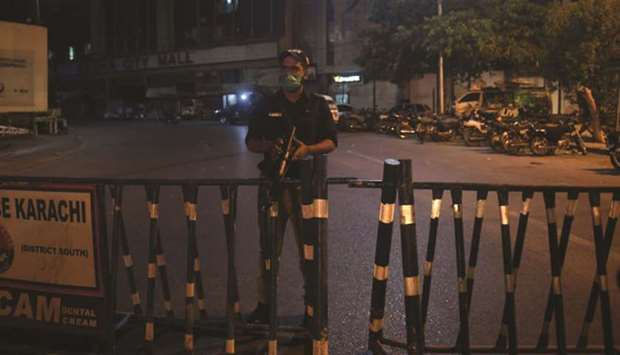Coronavirus hotspots in Karachi are to be locked down, the city’s commissioner said. The coronavirus causes the Covid-19 respiratory disease.
In an update, Commissioner Karachi Iftikhar Ali Shallwani said yesterday that a decision was made to lock down the metropolis’ sensitive areas by 7pm.
The move came in light of a report from the Karachi deputy commissioner that determined the coronavirus hotspots.
Shallwani issued a notification with details of the areas to be locked down to curb the spread of the coronavirus.
Any movement in the restricted hotspot areas would be banned during the lockdown, the update mentioned.
A day prior, the deputy commissioners of three of Karachi’s districts had identified the hotspots.
All 43 union councils (UCs) in the West, East, and Korangi districts were recommended to be locked down.
More than 157,000 infections and 3,000 deaths have been reported due to the coronavirus all over Pakistan, with close to 60,000 cases in both Sindh and Punjab.
Earlier this week, the National Co-ordination and Operation Centre (NCOC) had issued a list of 20 cities identified as coronavirus hotspots across Pakistan and, a day later, certain areas of the major cities were under “smart lockdown”.
“A total of 20 cities across Pakistan have been identified as having likely increase in ratio/speed of infection, which needs restrictive measures for containment,” a statement by the NCOC issued on Monday read.
In Sindh’s Ghotki, four areas have been sealed and Section 188 imposed after it was identified as one of the areas.
The cities identified by the NCOC were Karachi, Lahore, Quetta, Peshawar, Rawalpindi, Islamabad, Faisalabad, Multan, Gujranwala, Swat, Hyderabad, Sukkar, Sialkot, Gujarat, Ghotki, Larkana, Khairpur, DG Khan, Malakand, and Mardan.
The NCOC noted that the test, trace and quarantine (TTQ) strategy was aimed at identifying disease spread, focused clusters/hotspots to enable targeted lockdowns and need-driven resource optimisation at all levels.
A few day ago, National Information Technology Board (NITB) chief executive Shabahat Ali Shah shared a geographical snapshot of the city’s coronavirus hotspots.
Meanwhile, there has been a huge hue and cry on Pakistani Twitter and other media over the past two days, following Punjab Health Minister Dr Yasmin Rashid’s controversial but exasperated comments about Lahoris, whom she termed “ignorant”, and whose city is increasingly becoming the provincial hotspot for the coronavirus.
Although she apologised for her remarks, Lahoris were enraged and obviously not letting the matter drop.
Surprisingly, however, most people agree with the provincial health minister’s observation, so much so that according to a poll shared by a furious Ramiz Raja, the cricket commentator and former player, more than 80% of the respondents said they concurred with Rashid.
“How many of you agree with Dr Yasmin Rashid, venting her feelings at the Covid-19 situation in Lahore that Lahori, I being a Lahori too, are a different species, one of their kind,” Raja wrote, using the poll option on Twitter to gauge the stance.
More than 80% of thousands of Internet users who voted on the poll said that they agreed with Rashid that Lahoris “are a different species, one of their kind”.
Numerous Twitter users have also shared their views separately.
Weirdly, some Lahoris stubbornly refused to take this as a wake-up call to do better.
Others took to correcting those offended by the minister’s comments, saying that Lahoris are really not adhering to the social distancing measures and the government’s efforts.
Famed rapper Ali Gul Pir, on the other hand, posted a light-hearted video on the issue.
On Monday night, the provincial minister had said that she sometimes thought “Lahoris [feel they] are a special creation of God who are never ready to listen”.
She was criticising them for not practicing social distancing and for taking the deadly coronavirus lightly.
“I don’t think there is any nation as ignorant as us. No matter how many times you tell them to take precautionary measures, they never follow instructions,” Rashid remarked, adding that people had thrown caution to the wind during the Eid al-Fitr.

A police officer stands guard on a street sealed by the authorities at a residential area in Karachi.
